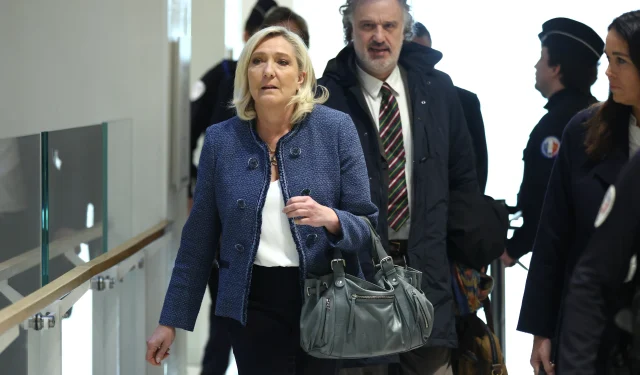Marine Le Pen Convicted of Embezzlement, Threatening 2027 Presidential Bid
Marine Le Pen, the leader of France’s far-right political party Rassemblement National (RN), has been convicted of embezzling public funds. This ruling raises significant barriers to her aspirations for the presidency in 2027, as it has rendered her ineligible to seek public office.
Details of the Case
The Paris court’s decision, issued on Monday, pertains to actions taken between 2004 and 2017, during which Le Pen, along with eight members of the European Parliament and twelve staffers from her party, illicitly diverted European Union resources to finance RN activities in France. The court assessed the damages at over $3 million (€2.9 million). The alleged fraud was executed primarily through “no-show”positions, where employees funded by EU resources were, in fact, engaged in RN party functions domestically. Le Pen has repeatedly denied any wrongdoing.
The Implications for Le Pen’s Political Ambitions
Having appeared in court only to leave before the conclusion of her sentencing, Le Pen faces a critical juncture in her political career. As a three-time presidential candidate, she has positioned herself as the leading opposition figure in France, gearing up to contest elections against Emmanuel Macron’s successor. Macron, barred from running again due to term limits after serving since 2017, leaves the door open for other contenders like Le Pen, who has previously reached the election run-off stage.
Le Pen previously claimed that a ruling barring her from public office would lead to her “political death,”emphasizing that such action would undermine democratic principles by negating the electorate’s choices. She has indicated plans to appeal the conviction. However, given France’s notoriously slow legal proceedings, a new trial may not occur until 2026, potentially limiting her campaign preparation time if her conviction is overturned.
The Broader Context of Right-Wing Movements in Europe
Le Pen’s case not only impacts her future but also reflects a broader shift towards right-wing politics across Europe. Recent developments include Giorgia Meloni’s ascendancy as Italy’s Prime Minister in a right-wing coalition and substantial electoral gains for the far-right Alternative for Deutschland (AfD) in Germany, where they captured 20.8% of the vote in recent elections.
Legal Proceedings and Potential Consequences
Prosecutors have recommended a five-year prison sentence for Le Pen, proposing that three years be suspended, alongside a fine of approximately $350,000 (€325,000) and a five-year ban from public office. This impending disqualification is likely to provoke responses from the international community, particularly from right-wing advocates in the United States, like Vice President JD Vance, who have criticized Europe for allegedly suppressing far-right voices.
The Kremlin has also responded, with spokesperson Dmitry Peskov condemning the ruling and asserting that it highlights a trend where European democracies are increasingly infringing on democratic norms. Additionally, Hungarian Prime Minister Viktor Orban has expressed solidarity with Le Pen through a supportive message on social media.
Future of the Rassemblement National
If Le Pen’s political career is impeded, the RN may look to the rising star of her 29-year-old protégé, Jordan Bardella, who has gained prominence through adept media performances in recent elections. The RN, once a smaller political entity, has transformed significantly, securing 123 positions in last year’s parliamentary elections and establishing itself as the major opposition party in France’s legislative assembly.
Conclusion: A Moment for Democratic Reflection
This ruling arrives amid ongoing debates about democratic integrity and accountability in the political landscape. A recent ruling by France’s Constitutional Council reaffirmed the principle of ineligibility while urging that such bans should reflect proportionality and respect for voter choices.
As history has shown, this is not the first time significant legal actions have been directed at prominent French politicians. Similar episodes highlight the challenges faced by various political figures and raise questions about the future of political engagement in France and beyond.


